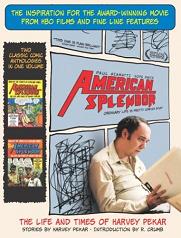As with a lot of people my first introduction to Harvey Pekar was with the movie American Splendor.
I'd wanted to check out some of his work for some time, but, unfortunately, the only American Splendor comic I could find was the one with the picture of a black soldier in Vietnam. Since I was far more interested in what Pekar had to say about normal, ordinary life than what he had to say about politics, I never really got around to picking it up.
My good friends, Clare Bear + Arf, solved my dilemma by buying it for me for Christmas.
While Pekar wrote all the stories it should be noted that he wasn't responsible for any of the art. The artists include Kevin Brown, Gregory Budgett, Sean Carroll, Sue Cavey, R. Crumb, Gary Dumm, Val Mayerik, and Gerry Shamray.
I guess if you're into the scene you might recognize some of these names. I only knew R. Crumb, and, even then, that's mostly because that fucker blew my brain with Fritz the Cat.
The art varies in style quite a bit and it's a good thing because it's always easy to get stale looking at the same person's work.
Furthermore, the artists are all so good at what they do that even if you don't like a particular artist's work you still have to recognise their ability to make their drawings reflect the story that's being told.
I, however, am a letters man: I like words and sentences and paragraphs and question marks and full stops, and, well, pictures can ultimately hang for all I care; I'm here for the stories.
American Splendor - The Life and Times of Harvey Pekar can be a frustrating read because you can get through five pages of pretty dense dialogue only to discover that the particular story that you've just read was utterly pointless, drab & boring.
Therein, however, lays both the genius and the appeal of Pekar's work. See, life is often utterly pointless, drab & boring. Pekar is merely communicating this - and he's doing so in a frank, uncompromising manner.
This, of course, begs the question, why would we want to actively read something so dry and depressing that does nothing more than remind us of the tedium that we're currently drowning in?
Well, the truth is that Pekar exposes in these pointless everyday stories the touching beauty, both at its most exciting and at its dullest, that is existence.
It takes a very intelligent sort of person, a "scholarly cat," as Pekar refers to himself, to wrest such beauty and, fuck it, splendour from ordinary life.
When he writes as the epilogue to one story, "I felt like cryin'; life seemed so sweet an' so sad an' so hard to let go of in the end..." you know that he isn't inflating life to make it seem more than what it actually is; it's rather that he's distilling life down to its very core and presenting it to us unadorned.
Incidentally, despite my attempt to pick up a non-politicised book, there's a particular story in this anthology where Harvey Pekar goes to town on what he considers to be a brutal carceral system that advocates punishment as opposed to rehabilitation. Kudos, Harvey!
Other than that, politics more inform the stories than they are a part of them.
If you too liked American Splendor, the movie, then I strongly suggest you pick up this particular anthology as it includes a lot of the art and dialogue that was used in the film.
nothing is meant; this is a beautiful accident
Reviewed on Thursday, 10 February 2005

